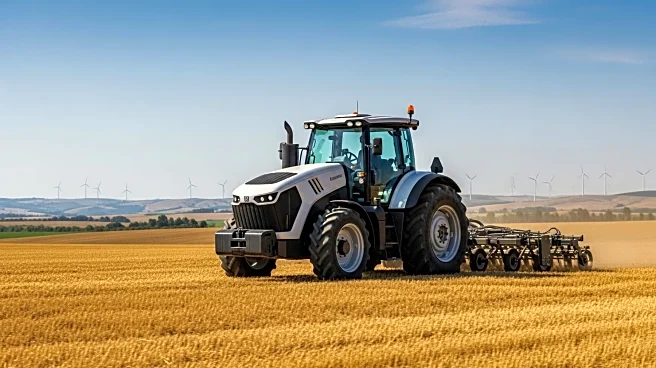What's Happening?
AGCO and John Deere have introduced autonomous tractor technology, marking a significant advancement in agricultural machinery. This technology allows tractors to perform tasks such as tillage and grain cart operations autonomously, reducing the need for human intervention. John Deere's autonomous upgrades and AGCO's OutRun aftermarket kit have moved beyond the trial stage, with limited commercial availability starting in 2025. Farmers can now purchase and utilize this technology outside of testing programs, with dozens of units already in operation. The autonomous systems are compatible with specific models of John Deere and Fendt tractors, and they require farmers to verify field boundaries and guidance lines using farm management software. Once set up, the tractors can operate independently, allowing farmers to focus on other tasks while monitoring progress through mobile apps.
Why It's Important?
The introduction of autonomous tractor technology is poised to revolutionize the agricultural industry by addressing labor shortages and optimizing planting schedules. This technology enables farmers to manage their operations more efficiently, potentially increasing productivity and reducing costs. By automating tasks like tillage, farmers can ensure timely planting, which is crucial for maximizing crop yields. The ability to operate tractors autonomously also allows for extended working hours, including overnight operations, further enhancing efficiency. As the technology becomes more widely adopted, it could lead to significant changes in farm management practices and the agricultural workforce.
What's Next?
As autonomous tractor technology becomes more prevalent, farmers and agricultural businesses will likely explore additional applications beyond tillage, such as fertilizer spreading and other crop cycle functions. AGCO and John Deere are expected to continue developing and expanding their autonomous solutions, potentially increasing compatibility with more tractor models and implements. The adoption of this technology may prompt discussions among policymakers and industry leaders regarding regulations, safety standards, and the impact on employment in the agricultural sector. Farmers will need to adapt to new management practices and invest in compatible equipment to fully leverage the benefits of autonomy.
Beyond the Headlines
The shift towards autonomous farming machinery raises ethical and cultural questions about the future of agriculture and the role of human labor. As technology takes on more tasks traditionally performed by humans, there may be concerns about job displacement and the need for retraining workers. Additionally, the reliance on advanced technology could lead to increased scrutiny regarding data privacy and cybersecurity in farm management systems. Long-term, the integration of autonomous technology in agriculture could drive innovation and sustainability, potentially influencing global food production and supply chains.









